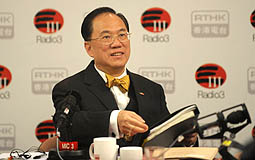 |
| On the air: Chief Executive Donald Tsang said now is the time to focus on the sustainability of Hong Kong's economic viability and vitality. |



|
Connectivity with the Mainland - the world's largest market - is crucial for Hong Kong, Chief Executive Donald Tsang says, stressing that a planned express rail line linking Hong Kong, Shenzhen and Guangzhou will generate a lot of wealth,"to do whatever we wish to, whether it's for the poor, for economic growth, for security or for the environment."
Elaborating on his Policy Address on an RTHK phone-in programme this morning, Mr Tsang rejected callers' criticism that not enough was being done to address poverty in Hong Kong.
"We have a reasonable regime for dealing with the less fortunate. We have Comprehensive Social Security Assistance scheme, we have subsidised housing, we have subsidised hospital services, medical care, and of course education. No young man or girl is deprived of university education because of means. All these are already on the menu. And we have a special arrangment for giving money to our elderly, as well," he said.
Over the last two years, the underprivileged had received many extra handouts, in the form of free rent and utility subsidies, for example, to help them ride out the difficult financial times. While the welfare regime would continue to operate as usual as the economic environment improved, now was the time to focus on "the sustainability of Hong Kong's economic viability and vitality".
"If we are going to maintain the present economic system, to generate that fixed amount of wealth, the amount of money dedicated to looking after the poor will be more or less fixed. If I'm going to increase it, it will be at the expense of our programmes, whether security or economic growth or environment. That is not the best way of going about things. That is not sustainable," he said.
"What I'm trying to do is increase the size of the cake, to make sure that we've got more money for the poor."
That is why his Policy Address called for the development of six new industries, alongside the maintenance of the four economic pillars, he said.
Rail link crucial
When a caller asked why the Chief Executive was prepared to spend $63 billion to build an express rail link from Hong Kong to Guangzhou, rather than giving that money to the poor, Mr Tsang replied that China is the largest market in the world - for Americans, Europeans, Japanese and Hong Kong.
"The Mainland of China, in which we have invested quite a lot of money over the last two and a half decades already, this is our major playing ground, it is the most important market. For that reason, connectivity with the Mainland will be absolutely important. That railway we intend to build and we hope we are able to finance will generate a lot of wealth to compensate, to do whatever we wish to, whether it's for the poor, for economic growth, for security or for the environment," he said.
"It's not a question of doing this and not doing the others. By the way, helping the poor is a continuous issue - you have to spend money year after year. Building a railway is a one-off exercise. It's comparing eggs with apples."
Property focus
When callers expressed concern over the high cost of real estate, Mr Tsang said the Administration looked at this question "almost on a daily basis". But he pointed out that prices for homes that appealed to the middle class were down 28% from their peak in October 1997 - and that incomes had gone up.
"We've got measures, but I must remind myself all the time that the Government very often finds it difficult to support the [property] market, to boost the market in terms of price level, but has enormous capability of destroying it, by using policy. So I have to be very careful that we are not going to do that. We must remember in Hong Kong there are over 1 million home owners who do not want the value of their property to come down because of a silly Government policy," he said.
Universal suffrage
When asked to clarify whether some form of functional constituencies would be part of a new legislature elected by universal suffrage, the Chief Executive said it is up to Hong Kong people to decide.
"As far as I'm concerned, the way in which we elect our legislators through the present system of functional constituencies would not meet the criteria for universal suffrage.
"If we're going to have them, they have to be changed. If we're going to have them, then let's argue that out. What's important is not what I think, but what the Hong Kong people believe in and what they want.
"There's one very important hurdle we have to go through, and that's the approval of the legislature of any change to the present electoral system. It's not only the passage by half of them, but two-thirds of them. Half of our legislators are from the functional constituencies. They need to be persuaded why they should go self-destruct. They have to be persuaded that it is for the good of all the people."
Go To Top
|



